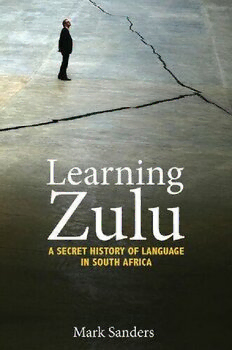
Learning Zulu: A Secret History of Language in South Africa PDF
Preview Learning Zulu: A Secret History of Language in South Africa
Learning Zulu Learning Zulu A Secret History of Language in South Africa Mark Sanders Princeton University press Princeton and Oxford Copyright © 2016 by Princeton University Press Published by Princeton University Press, 41 William Street, Princeton, New Jersey 08540 In the United Kingdom: Princeton University Press, 6 Oxford Street, Woodstock, Oxfordshire OX20 1TW press.princeton.edu Jacket image courtesy of PA Images. Reprinted with the permission of Scribner, a Division of Simon & Schuster, Inc., from Cry, the Beloved Country by Alan Paton. Copyright © 1948 by Alan Paton. Copyright renewed © 1976 by Alan Paton. All rights reserved. Reprinted by permission of The Random House Group Limited, from Cry, the Beloved Country by Alan Paton. Published by Jonathan Cape. Scriptures taken from the Bible in isiZulu (Zulu) 1959/1997 © Bible Society of South Africa 1959, 1997. Used with permission. All rights reserved. Excerpt from Sibusiso Nyembezi, Mntanami! Mntanami! in epigraph to chapter two used by permission of Pearson Marang (Pty) Limited. All Rights Reserved ISBN 978–0- 691–16756–5 Library of Congress Control Number: 2015939780 British Library Cataloging- in- Publication Data is available This book has been composed in Minion Pro Printed on acid- free paper. ∞ Printed in the United States of America 10 9 8 7 6 5 4 3 2 1 To my teachers Contents Introduction 1 Chapter 1 Learn More Zulu 14 Chapter 2 A Teacher’s Novels 49 Chapter 3 Ipi Tombi 74 Chapter 4 100% Zulu Boy 96 Chapter 5 2008 115 Acknowledgments 145 Notes 147 Select Bibliography 183 Index 193 Introduction Ngicela uxolo I stand before the class, telling the students who I am, where I come from, and what brings me to the school. I notice as Mr. Nzuza, who is standing at the back of the classroom beside my desk, discreetly opens the book in which I have been taking notes. Although I am not exactly another pupil, he is the teacher and he has every right to examine my notes. He sees that I see him. I continue to speak. Maybe he wants me to have seen him—to be aware that he is watching, but also to know that he is curious to read what I have written. I cannot know whether this is what he intended. Yet my guess at it—which is already shaping the mem- ory—leaves me with a twofold awareness: he is reading, and he is watching. It is within the influence of this awareness that I embark on this book. I have to trust the reader. I have to trust that the one whom I picture as watching me as I write would like to think that he, or she, is reading something I wrote while he, or she, was not watching. If, for the reader whom I picture, to want this is to want the impossible, to imagine writing for such a reader, that is impossibility itself. Yet there is no writing without that step. Not for me, not with this book. Our text is Ngicela uxolo, a play by Nkosinathi I. Ngwane,1 an author I have never heard of. I am provided with a copy of the book on my first day. How uncanny that, only a few weeks before, I was reading an old radio play by D.B.Z. Ntuli with exactly the same title: Ngicela uxolo (I beg forgiveness). Like the puns that came to me as I took my first steps back into learning Zulu, as I worked with my teacher Eckson Khambule in New York City a few months before, the words ngicela uxolo had become a text for transference, a way toward finding myself in the language. “Finding myself”—it is easy to say, and to say, dismis- sively, of the one learning Zulu: he is finding himself, he is still finding himself. But there is more to it: in speaking a language, one appropriates the language, makes it one’s own. One becomes a “self” by virtue of speaking that language— by assuming the position of “I.” Ngi- . . . ngicela . . . ngicela uxolo. The assumption of this position is, for me, not without inhibition. To speak is to bite one’s tongue—such was the first coded sentence when, with Eckson, I began to play on words. To assume the position of speaking subject was to as-
